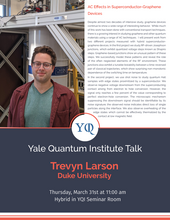Event time:
Thursday, March 31, 2022 - 11:00am to 12:00pm
Audience:
YQI Researchers
Location:
Hybrid (YQI Seminar Room or Zoom)
Event description:
AC Effects in Superconductor-Graphene Devices
Despite almost two decades of intensive study, graphene devices continue to show a wide range of interesting behavior. While much of this work has been done with conventional transport techniques, there is a growing interest in studying graphene and other quantum materials using a range of AC techniques. I will present work from two different projects measured with hybrid superconductor-graphene devices. In the first project we study RF-driven Josephson junctions, which exhibit quantized voltage steps known as Shapiro steps. Graphene-based junctions show an unusual pattern of these steps. We successfully model these patterns and reveal the role of the often neglected elements of the RF environment. These junctions also exhibit a tunable bistability between a time-reversed pair of classical trajectories, which show surprising non-monotonic dependence of the switching time on temperature.
In the second project, we use shot noise to study quantum Hall samples with edge states proximitized by a superconductor. We observe negative voltage downstream from the superconducting contact arising from electron to hole conversion. However, the signal only reaches a few percent of the value corresponding to perfect electron-hole conversion. The microscopic mechanism suppressing the downstream signal should be identifiable by its noise signature; the observed noise indicates direct loss of single particles along the interface. We also observe overheating of the edge states which cannot be effectively thermalized by the contact at low magnetic field.
